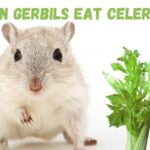Watermelon is one of the most adored fruits on the planet, it grows almost everywhere and it’s so refreshing especially in the summer.
Gerbils are omnivorous animals that would eat almost anything you give them, but this does not mean that you should give anything before checking it.
Every animal’s digestif system is adapted to his natural environment, and gerbils live in the desert where water-based fruits like watermelon do not exist.
All fruits and vegetables should be fed to gerbils in small quantities of around 10% of their daily diet which consists of seed mix pellets.
Looking for healthy treats to balance your gerbil’s nutrition is important,but not as important as choosing the best food for his main diet.
The best and healthier gerbil mix we recommend is the Oxbow garden Select Gerbil Food (check the current price on Amazon), it’s made of pellets which are best for gerbils that tend to pick fatty seeds and leave the rest.
Table of Contents
Can gerbils eat watermelon?
No, gerbils should not eat watermelon or have really small portions simply because it contains too much water content for their system to handle, watermelon is a water-rich fruit and gerbils are desert species that have adapted to consuming very little water.
Feeding your gerbil watermelon in large quantities will definitely lead to digestion disorders and potentially diarrhea.
The fruits and vegetables are only given to gerbils to balance their diet and provide the missing nutrients in their seed mix.
Make sure you don’t use the same fruit or vegetable every day for better results and introduce new food items slowly since gerbils have very sensitive tummies.
Consumption of small quantities of watermelon(the red part) is ok but only once every few weeks or so to avoid disturbing their diet.
Do gerbils eat watermelon in the wild?
In the wild gerbils feed essentially on seeds and occasionally on other plants and small insects, hence the need to introduce other fruits and vegetables.
However, gerbils live in desert areas of the world where water is not easy to find so their systems are built to preserve water and to eat food with low water presence.
Watermelon is a water-based fruit that does not grow in the desert so in nature gerbils never have access to watermelon or any fruit of the same type.
That is why you need to be careful when feeding your gerbil food items that do not grow in his natural habitat and must check every food before doing so.
Can gerbils eat watermelon rind?
The watermelon rind is too hard for gerbils to process and could present a choking hazard so it is not advised to feed it to your gerbils.
Watermelon skin contains very few nutrients anyway and there is no point in feeding it to your gerbils since the main idea is to balance their diet.
The fruit skin is the most exposed part of the fruit to pesticides and other chemicals so it’s always best to avoid it.
Can gerbils eat watermelon seeds?

Watermelon seeds aren’t toxic, but they’re not exactly delicious neither, when accidentally eaten they would not harm your gerbil, but he’ll probably leave them if he’s got better seeds to eat.
Watermelon seeds don’t contain the usual nutrients found in other seeds gerbils feed on so it can not be a substitute to their seeds mix.
They are not so delicious so they don’t work as treats neither, all in all, they are more a bother than an actual snack.
And Yes they don’t grow into watermelon trees inside their tummy.
How much watermelon can gerbils eat?
Watermelon should not be a part of the gerbil’s diet and only given occasionally in very small portions.
A bite-sized portion is more than enough once every few weeks to avoid any disturbance of their diet.
They are water-based fruits(hence the name) and gerbils can’t handle too much water and could get diarrhea from eating too much watermelon.
Is watermelon safe for gerbils?

When given to gerbils in large quantities or frequently watermelon could lead to digestive disturbances, most commonly diarrhea, and potentially weight loss.
Any fruit that does not grow in the natural habitat of the gerbils should be checked before given to them especially one that contains too much water.
However, watermelon is not toxic and is not fatal even if given in large quantities, but it should be avoided anyway.
Health benefits of watermelon for gerbils
Watermelons are mostly water — about 92 percent — but this refreshing fruit is soaked with nutrients. Each juicy bite has significant levels of vitamins A, B6, and C, lots of lycopene, antioxidants, and amino acids. There’s even a modest amount of potassium. Plus, this quintessential summer snack is fat-free, very low in sodium, and has only 40 calories per cup. Foods that are high in antioxidants and amino acids allow your body to function optimally.
livescience
Despite its health benefits for us watermelon is not the best snack for gerbils with its 92% water, but it still has some good nutrients that could benefit your gerbils, but again if there are other alternatives.
For more details on the nutrients in watermelon expend the table below:
Watermelon full nutrients list| Name | Amount | Unit |
|---|---|---|
| Water | 91.45 | g |
| Energy | 30 | kcal |
| Protein | 0.61 | g |
| Total lipid (fat) | 0.15 | g |
| Carbohydrate, by difference | 7.55 | g |
| Fiber, total dietary | 0.4 | g |
| Sugars, total including NLEA | 6.2 | g |
| Calcium, Ca | 7 | mg |
| Iron, Fe | 0.24 | mg |
| Magnesium, Mg | 10 | mg |
| Phosphorus, P | 11 | mg |
| Potassium, K | 112 | mg |
| Sodium, Na | 1 | mg |
| Zinc, Zn | 0.1 | mg |
| Copper, Cu | 0.042 | mg |
| Selenium, Se | 0.4 | µg |
| Vitamin C, total ascorbic acid | 8.1 | mg |
| Thiamin | 0.033 | mg |
| Riboflavin | 0.021 | mg |
| Niacin | 0.178 | mg |
| Vitamin B-6 | 0.045 | mg |
| Folate, total | 3 | µg |
| Folic acid | 0 | µg |
| Folate, food | 3 | µg |
| Folate, DFE | 3 | µg |
| Choline, total | 4.1 | mg |
| Vitamin B-12 | 0 | µg |
| Vitamin B-12, added | 0 | µg |
| Vitamin A, RAE | 28 | µg |
| Retinol | 0 | µg |
| Carotene, beta | 303 | µg |
| Carotene, alpha | 0 | µg |
| Cryptoxanthin, beta | 78 | µg |
| Lycopene | 4532 | µg |
| Lutein + zeaxanthin | 8 | µg |
| Vitamin E (alpha-tocopherol) | 0.05 | mg |
| Vitamin E, added | 0 | mg |
| Vitamin D (D2 + D3) | 0 | µg |
| Vitamin K (phylloquinone) | 0.1 | µg |
| Fatty acids, total saturated | 0.016 | g |
| 4:0 | 0 | g |
| 6:0 | 0 | g |
| 8:0 | 0 | g |
| 10:0 | 0.001 | g |
| 12:0 | 0.001 | g |
| 14:0 | 0 | g |
| 16:0 | 0.008 | g |
| 18:0 | 0.006 | g |
| Fatty acids, total monounsaturated | 0.037 | g |
| 16:1 | 0 | g |
| 18:1 | 0.037 | g |
| 20:1 | 0 | g |
| 22:1 | 0 | g |
| Fatty acids, total polyunsaturated | 0.05 | g |
| 18:2 | 0.05 | g |
| 18:3 | 0 | g |
| 18:4 | 0 | g |
| 20:4 | 0 | g |
| 20:5 n-3 (EPA) | 0 | g |
| 22:5 n-3 (DPA) | 0 | g |
| 22:6 n-3 (DHA) | 0 | g |
| Cholesterol | 0 | mg |
| Alcohol, ethyl | 0 | g |
| Caffeine | 0 | mg |
| Theobromine | 0 | mg |
Alternatives to watermelon gerbils can eat
It is best to avoid feeding watermelon to gerbils especially that there are plenty of other alternatives that would not present any issues for the gerbils to process.
fruits like bananas, apples, and vegetables like carrots are much better alternatives while others are best avoided like celery.
Gerbils would eat almost anything you give them but making a good and healthy choice for a balanced diet is your responsibility to keep your gerbils healthy.
Gerbils have very sensitive tummies and are very sensitive to any sudden change in their diet, and can easily get fat or lose weight, so any new food should be introduced gradually.
Conclusion: Can gerbils eat watermelon?
Gerbils can eat watermelon but due to its high % of water, it is better to avoid it and substitute it with other vegetables and fruits that gerbils can handle better.
In case of consumption it should only be given in small quantities and no more than once every few weeks, so the gerbil’s system can process all that water.
Gerbils are desert animals and are built to eat food with low water content, not water-based fruits, so it would be better for their health to avoid it.
Continuous or overconsumption of watermelon often leads to diarrhea in gerbils.
Other foods gerbils can eat
- Bananas
- Apples (without seeds)
- Almonds (not bitter almonds)
- Carrots
- Celery
- Broccoli
- Raspberries
- Green beans
- Mealworms
- Cheese
- Cheerios






